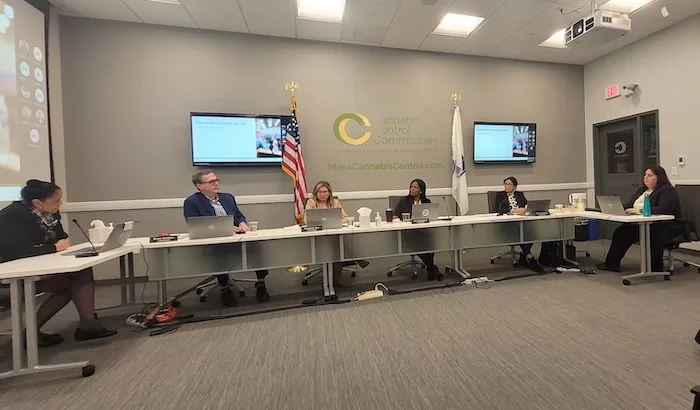
Cannabis regulators vote to scrap “burdensome” “two-driver” rule. “We have met with delivery operators and couriers to truly understand. … It was a collaborative conversation.”
Lucky Green Ladies. Delivered. Rolling Releaf. Gas Bus. Zyp Run. Green Flash. Green Line. Blossom Flower. Your Green Package.
Those are not the names of superheroes, but on Thursday, some of the owners of those Massachusetts cannabis delivery businesses pulled off a heroic feat.
Together with friends and supporters, they made for a noticeable influx of in-person attendees at a Cannabis Control Commission meeting. Commissioner Nurys Camargo commented, “This is probably the biggest crowd we’ve had” in the Worcester office.
It was a long time coming. For years, people with these licenses have asked for changes, including to the rule that requires cannabis delivery companies to put two employees on the road together. Operators say they are already struggling due to excessive compliance among other factors, and argue that the two-agent stipulation is especially burdensome. Other changes they have pushed for, as operators wrote in a letter to the CCC in October, include: “deliveries to towns that do not allow for adult use retail; deliveries to hotels; [an extension of] the [Social Equity] exclusivity period for two to four additional years,” and adjustments that “allow delivery operators to repackage” cannabis, for example into smaller bags, as dispensaries are currently permitted to do.
There had been hints of progress on this front in the past, but efforts seemed to fizzle out. In August, it looked like delivery was about to get pushed to the back of a long line of other items again, after commissioners missed an opportunity to take it up due to internal squabbling. But tenacious owners kept applying pressure, and through a fall in which they had their hands full with other regulatory rewrites as well, CCC members nonetheless dove back into delivery.
“Delivery … means something, and it’s important that we get it right,” acting Chair Ava Callender Concepcion said at Thursday’s meeting. “It’s important that we are … listening to the people doing the work.”
Unique to the Massachusetts industry, Marijuana Delivery Operator and Courier licenses (which differ from each other in how holders are made to store and distribute products) were created exclusively for Social Equity and Economic Empowerment applicants. There are currently 20 Delivery or Courier establishments up and running out of 600 Marijuana Establishments that commenced operations in Mass as of Dec. 1. Many of those digital doorstep distributors are facing significant cost burdens, while more than 250 other applicants in their categories are still behind them at different stages of the punishing licensing process.
“It’s a big moment,” Commissioner Nurys Camargo said. “We set the bar high—especially when it comes to being responsive to our constituents … We have met with delivery operators and couriers to truly understand. … It was a collaborative conversation.” Commissioner Bruce Stebbins noted, as all other members have before, that the point of these designations was to lift up business people, not to erect additional barriers.

Commissioners posted five topics for discussion on Thursday: 1 – Two agents in a vehicle; 2 – License caps; 3 – Repackaging; 4 – Delivering to “No” towns [where weed is still the stuff of outlaws]; 5 – Delivery to hotels.
In doing their homework, CCC members and their supporting staffers communicated with every state in the country that has delivery, mostly asking about safety hazards that could happen upon solo drivers. Among other comparative details, their exhaustive search revealed that Mass is the lone market that currently always requires two agents in a vehicle.
Furthermore, while there have been incidents and accidents involving single drivers elsewhere, no one seems to think it’s enough of a problem to stop Mass from changing its law. The lack of opposition became apparent when Commissioner Kimberly Roy read a letter supporting the removal of the two-driver rule from the Massachusetts Chiefs of Police Association—penned by none other than one-time arch-prohibitionist Police Chief John Carmichael, currently of the Newton Police Department. For those familiar with Carmichael’s past positions on pot topics—he copped to recommending this rule in the first place—it was like hearing Kid Rock perform a Beyonce song. People in the gallery cheered.
Though nothing comes easy at the CCC, by this point, members were prepared to move steadily toward a vote on at least some of these delivery issues. And they appeared to be in agreement that, as Camargo put it, “this regulation adds unnecessary cost,” while there are already plenty of other security measures in place to ensure driver and customer safety. Roy then transitioned the camaraderie into a teaching moment, addressing the onlooking operators directly.
“If we need to beef up [the delivery safety] curriculum, then we will beef it up,” the commissioner said. “This is an incredible opportunity to become more lucrative, but the onus is on you. I don’t ever want to read, see, or hear of anybody getting hurt because they weren’t properly trained and they didn’t know situational awareness.”
Commissioners passed the motion to advance the driver stipulation change into the formal regulatory process, then took up a motion addressing the number of delivery-type licenses an individual can control—specifically, to raise it to three from two, which would bring the cap in line with every other category. It’s less of a priority for license holders, but commissioners appeared to agree that it warrants attention sooner than later.
After some discussion about what particulars might look like once the motion moves through the regulatory meat grinder, they passed it, but with language that leaves room for further proper interpretation. “It gives it the ability to delve into it more when you’re not overspecifying,” Concepcion said. “Next year,” Camargo said, “we are going to have to come back and have this conversation about whether to extend the equity [window] and let this license type breathe a little bit.”
A third motion, to allow Delivery Operators “to uniformly wrap or seal Marijuana that has already been wrapped or sealed, into a ready-made product for retail sale, without combining, infusing, or changing the chemical composition of the Marijuana,” passed unanimously with no deliberation.

Though commissioners weren’t ready to bring a motion related to opening up “No” towns to deliveries, they did speak about their demonstrable increased outreach on this front. Currently, 124 out of 351 municipalities are off limits to grass on the go. Stebbins also gave an update on his inroads with hotel stakeholders about opening their venues to deliveries. He’s hopeful, but they’re still asking silly questions about people smoking in rooms. Maybe someone can get Chief Carmichael to talk to them.
As for the motions they did pass, Camargo noted to the crowd: “This is a process. … There’s a lot on the plate at the commission. We have to go back, confer with compliance, legal, and policy … we have to draft, deliberate it … post it out for public comment.”
Per the motions, “The sponsoring Commissioner shall present the draft regulations [at] a future meeting for the full Commission’s deliberation and vote.”
“This is the beginning of the public process,” Camargo said. “Unfortunately, you have been the guinea pigs of this industry, but I think it will be a better license type in the future.”
“For me it’s a relief,” said Chris Fevry, the CEO of Dris/Your Green Package. “Delivery companies have shut down because of cost. This is something that will make the license viable. It’s just a big win. We’re not delivering uranium. I’m just glad the playing field is leveled.”
“I can’t believe this day actually came,” Ruben Seyde, the founder and CEO of Delivered Inc in Central Mass, told Talking Joints Memo after the meeting. “Today’s CCC vote regarding delivery regulations is a testament to what can be accomplished when a community comes together and advocates for change.
“Huge shoutout to all of the delivery operators that lead this advocacy charge. Now I just hope the CCC can flesh out these new regulations in a timely manner so that the public comment period begins asap and then allows us to implement these changes before any more businesses run out of funding.”

























